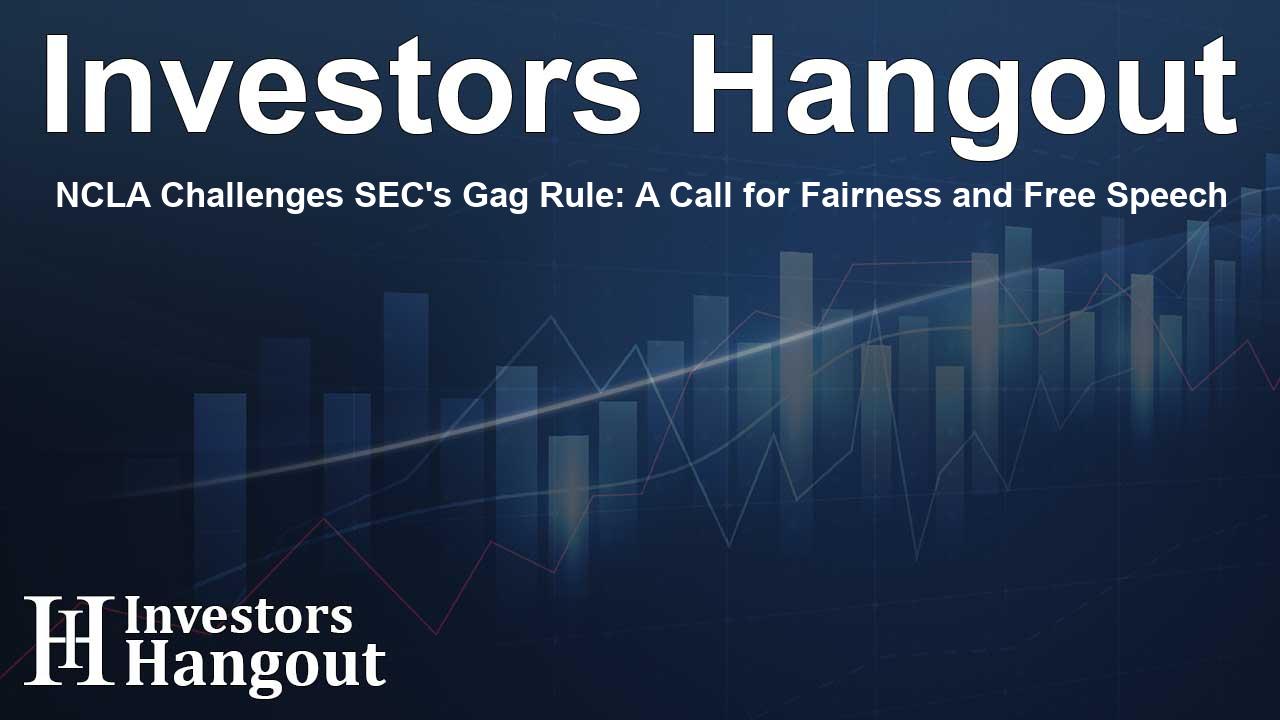NCLA Challenges SEC's Gag Rule: A Call for Fairness and Free Speech

The Fight Against the SEC's Gag Rule
The New Civil Liberties Alliance (NCLA) has made headlines by petitioning the U.S. Court of Appeals for the Ninth Circuit for an en banc rehearing regarding a significant First Amendment case. This case, known as Powell, et al. v. Securities and Exchange Commission, centers around NCLA's challenge of the SEC's longstanding "Gag Rule." This rule effectively silences those who settle regulatory enforcement cases with the SEC, preventing them from publicly discussing their experiences or criticisms.
Understanding the Gag Rule
For anyone settling a case with the SEC, the Gag Rule imposes an unwritten prohibition—no criticism can be voiced publicly, ever. This has profound implications for the rights of individuals as the rule extends to prominent clients like Thomas Powell and Joseph Collins. NCLA argues that the Ninth Circuit panel neglected to address multiple essential arguments regarding this lack of consent, thus undermining the freedom of speech guaranteed by the First Amendment.
NCLA's Concerns Over the Panel's Decision
NCLA expressed dissatisfaction with how the Ninth Circuit panel approached the issue, noting that it ignored claims brought forth by its clients and others. This panel's failure to engage with significant claims undermines the rights of these individuals and prioritizes regulatory silence over the fundamental principles of free speech and open critique of government actions. These procedural oversights remind us of the dire need for reform in the SEC's practices.
The Implications of This Legal Challenge
The legal landscape regarding speech rights in regulatory cases is taking center stage in this ongoing battle. The Gag Rule, which has been in place since 1972, not only restricts speech but potentially confuses public perceptions of regulatory fairness. Many individuals under this rule perceive a term of silence, a condition that thrives on non-disclosure and eroded trust between the enforcing agency and the public.
SEC's Authority Under Scrutiny
NCLA questions the SEC’s authority to enforce such restrictions through the Gag Rule. The argument stands that the SEC lacks statutory power to impose these restrictions within the scope of the First Amendment, which protects individuals from prior restraint on speech. This presents an essential challenge to how regulatory bodies operate and the accountability mechanisms available for them.
A Call to Action from NCLA
NCLA has emphasized the national significance of reviewing the Gag Rule. The implications of the panel's decision suggest a dangerous precedent; allowing agencies to suppress public commentary undermines the very foundation of American democracy. By seeking an en banc rehearing, they are insisting that free speech rights be honored and upheld. NCLA believes that without adequate checks on agency actions, the space for accountability decreases.
Public Reaction and the Future
Advocates for free speech and various civil liberties organizations are closely monitoring this case. Responses have been mixed; some argue for stringent oversight of regulatory bodies, while others express concerns regarding the balance of power. As the case evolves, it's clear that American citizens are watching closely, eager for any sign of progress or change regarding their rights.
NCLA's Commitment to Civil Rights
NCLA is committed to advocating for the protection of constitutional freedoms against encroachments by the regulatory state. Founded by legal scholar Philip Hamburger, NCLA seeks to illuminate the unlawful expansion of power exercised by regulatory agencies and bring about meaningful reform in how these agencies engage with the public and handle enforcement actions.
Frequently Asked Questions
What is the SEC's Gag Rule?
The Gag Rule prevents individuals who settle with the SEC from publicly discussing or criticizing their cases, impacting their freedom of speech.
Why is NCLA challenging the Gag Rule?
NCLA argues that the Gag Rule violates individuals' First Amendment rights and lacks statutory authority, demanding a reconsideration of its enforceability.
Who are some clients affected by the Gag Rule?
Affected clients include notable individuals such as Thomas Powell, Cassandra Toroian, and Barry Romeril, who are restricted from sharing their viewpoints.
What are the implications of this legal case?
The case raises important questions about the balance of regulatory power and individual rights, potentially setting precedents for future cases.
How can individuals learn more about NCLA's work?
Individuals interested in NCLA's advocacy can find more information through their case pages and public communications.
About The Author
Contact Thomas Cooper privately here. Or send an email with ATTN: Thomas Cooper as the subject to contact@investorshangout.com.
About Investors Hangout
Investors Hangout is a leading online stock forum for financial discussion and learning, offering a wide range of free tools and resources. It draws in traders of all levels, who exchange market knowledge, investigate trading tactics, and keep an eye on industry developments in real time. Featuring financial articles, stock message boards, quotes, charts, company profiles, and live news updates. Through cooperative learning and a wealth of informational resources, it helps users from novices creating their first portfolios to experts honing their techniques. Join Investors Hangout today: https://investorshangout.com/
The content of this article is based on factual, publicly available information and does not represent legal, financial, or investment advice. Investors Hangout does not offer financial advice, and the author is not a licensed financial advisor. Consult a qualified advisor before making any financial or investment decisions based on this article. This article should not be considered advice to purchase, sell, or hold any securities or other investments. If any of the material provided here is inaccurate, please contact us for corrections.
